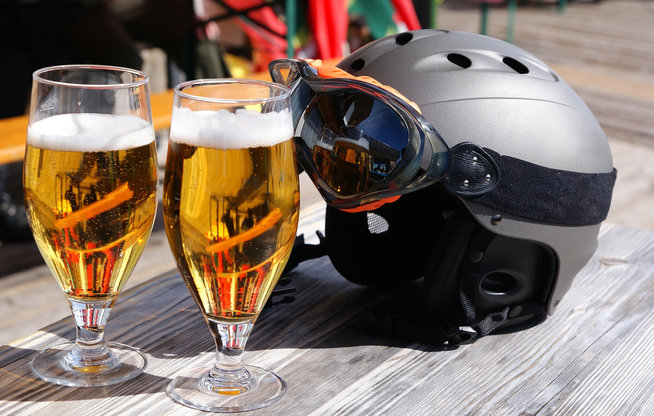Après-Ski Injuries: Who’s Liable for Alcohol-Related Accidents at Resorts?
The exhilaration of a day on Colorado’s slopes often extends into evening celebrations at resort bars, restaurants, and lodge facilities where alcohol flows freely among tired and euphoric skiers and snowboarders. While après-ski culture represents an integral part of mountain resort experiences, the combination of alcohol consumption, fatigue from physical activity, and icy walkways creates dangerous conditions that lead to serious accidents. When intoxicated guests slip on untreated surfaces, fall down stairs, or suffer injuries in resort facilities, determining legal responsibility involves complex questions about premises liability, alcohol service laws, and comparative negligence.
At Mintz Law, we regularly handle premises liability cases involving alcohol-related accidents at Colorado ski resorts and mountain lodges. Our experienced personal injury attorneys understand how alcohol service laws, property maintenance obligations, and resort safety protocols intersect to create liability for guest injuries. We help accident victims navigate insurance claims and legal proceedings while pursuing maximum compensation for medical expenses, lost wages, and other damages resulting from resort negligence.
Resort Premises Liability for Intoxicated Guests
Colorado ski resorts have a legal duty to maintain reasonably safe conditions for all guests, including those who have consumed alcohol at on-site facilities. Snowboarding and skiing injuries often occur when resorts fail to adequately maintain walkways, parking areas, and building entrances where intoxicated guests may be more susceptible to falls. This obligation includes proper lighting, ice and snow removal, slip-resistant surfaces, and adequate handrails on stairs and elevated walkways.
Property owners cannot simply dismiss their safety responsibilities because guests have been drinking. Courts evaluate premises liability cases based on whether property owners knew or should have known about dangerous conditions and failed to remedy them within a reasonable time. When resorts operate bars and restaurants that serve alcohol, they create foreseeable situations where intoxicated guests will navigate their facilities, making proper maintenance and safety precautions even more critical for preventing accidents.
Resorts also face liability when they create or worsen dangerous conditions through their own actions. For example, if resort staff pile snow in walkways without marking the obstruction, or if they fail to salt icy areas near bar exits, they may be held responsible for resulting slip and fall accidents. The fact that an injured guest had consumed alcohol doesn’t automatically eliminate resort liability, particularly when dangerous conditions existed regardless of the guest’s sobriety level.
Dram Shop Laws and Alcohol Service Liability
Colorado’s dram shop laws hold establishments liable for injuries caused by patrons they serve alcohol to under certain circumstances. These laws apply to resort bars, restaurants, and any facility that serves alcoholic beverages to guests who later cause accidents or suffer injuries due to intoxication. Resort liability may extend beyond their own premises when over-served guests cause accidents in parking lots, on resort shuttles, or in nearby areas.
Establishments face liability when they serve alcohol to visibly intoxicated persons or continue serving patrons who clearly cannot safely consume additional alcohol. Resort staff trained in responsible alcohol service should recognize signs of intoxication and refuse further service when appropriate. When bars and restaurants fail to monitor guest alcohol consumption adequately, they may bear legal responsibility for subsequent accidents and injuries involving those guests.
Common Après-Ski Accident Scenarios
Resort alcohol-related accidents frequently occur in predictable locations and situations where property maintenance and alcohol service intersect. Bathroom facilities often become hazardous when wet floors combine with intoxicated guests who have difficulty maintaining balance. Lodge entrances and exits present particular dangers when snow, ice, and alcohol impairment create slip hazards that sober guests might easily navigate.
Parking lot accidents represent another common scenario where resort liability may apply. When resorts operate shuttle services or encourage guests to walk through poorly maintained parking areas after consuming alcohol at resort facilities, they must ensure these areas remain reasonably safe. Inadequate lighting, unmarked obstacles, and icy surfaces all contribute to accidents that may have been preventable with proper maintenance and safety measures.
Hot tub and pool areas at resort accommodations frequently see alcohol-related injuries when intoxicated guests slip on wet surfaces or suffer injuries due to inadequate supervision and safety equipment. These facilities often combine alcohol service with inherently dangerous conditions, making proper maintenance and safety protocols essential for preventing serious accidents and drowning incidents.
Challenges in Alcohol-Related Injury Cases
Proving resort liability in alcohol-related accidents requires overcoming defense arguments about guest responsibility and comparative negligence. Resort attorneys typically argue that intoxicated guests assumed the risk of injury through their alcohol consumption and should bear primary responsibility for their accidents. However, this defense doesn’t eliminate resort liability when dangerous conditions existed or when establishments violated alcohol service laws.
Documentation becomes crucial for building strong cases in these situations. Witness statements, surveillance footage, and evidence of dangerous conditions help establish that resort negligence contributed to accidents regardless of guest alcohol consumption. Personal injury attorneys experienced in premises liability cases know how to counter comparative negligence defenses and demonstrate that property maintenance failures or alcohol service violations were the primary cause of accidents.
Protect Your Rights with Mintz Law
Après-ski injury cases involving alcohol require sophisticated legal analysis of premises liability, dram shop laws, and resort safety obligations. At Mintz Law, our team brings more than 300 years of combined experience to every case, having recovered over $20 million annually for clients since 2016. Our 12 attorneys average 20 years of experience each, providing the comprehensive knowledge needed to handle complex resort liability claims involving alcohol service and premises maintenance issues.
We understand that resort accidents can result in serious injuries requiring extensive medical treatment and extended recovery periods. Our free consultations allow us to evaluate your case thoroughly and explain how Colorado’s premises liability and alcohol service laws apply to your specific situation. Because we work on a contingency fee basis, you pay no attorney fees unless we successfully recover compensation for your injuries. Contact Mintz Law today at 303-462-2299 or schedule your free consultation to protect your legal rights and pursue the compensation you deserve.

